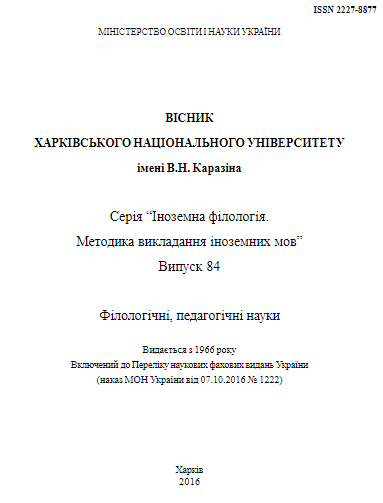The specific character of role configurations in the destructive family communication
Abstract
The article analyses the specifics of the destructive family communication and defines its typical role configurations. The content as well as the communicative purpose of the destructive communication in general and of the family communication in particular has been taken into account. The main features and tactics of destructive-communicative person’s behaviourwere classified. The personal traits which are at the root of the destructive communication and also the communication conditions that one must consider to qualify this communication as destructive have been described in the paper.Thepeculiarities of English family destructive communication has been studied, the conceptual structure of family conflict communication has been determined as that consisting of macro-components – the basic roles of the nuclear family members and their components – clustered roles. Typical role configurations of English-speaking communicants were systematized and examined proceeding from the quantative indices of role actualization in destructive family interaction.
Downloads
References
філол. наук : спец. 10.02.04 «Германські мови» / А.А. Бігарі. – К., 2006. – 21 с.
Бровкіна О.В.
Маніпуляції як вид імпліцитного впливу в дискурсі родинного спілкування / О.В. Бровкіна // Науковий вісник Волин. нац. ун-ту імені Лесі Українки. – 2011. – № 4. – С. 132–137.
Волкова Я.А. Деструктивное общение в когнитивно-дискурсивном аспекте : автореф. дис. на соискание учен. степени докт. филол. наук : спец. 10.02.19 «Теория языка» / Я.А. Волкова. – Волгоград, 2014. – 48 с.
Гридасова О.І. Особливості актуалізації стереотипних ролей в англомовному сімейному конфліктному дискурсі : автореф. дис. на здобуття наук. ступеня канд. філол. наук : спец. 10.02.04 «Германські мови» / О.І. Гридасова. – Харків, 2010. – 20 с.
Козлова В.В. Вербальні маркери статусної асиметрії в англомовному парентальному діалогічному дискурсі / В.В. Козлова // Методологічні проблеми сучасного перекладу : VIII Міжнар. наук.-метод. конф.,
23–25 січня 2009 р. : тези доп. – Суми : СумДУ, 2009. – С. 63–64.
Кручек В.А. Психолого-педагогічні основи міжособистісного спілкування :
навч. посібник / В.А. Кручек. – К. : ДАКККіМ, 2010. – 273 с.
Психологія сім’ї: для студ. вузів / [В.М. Поліщук, Н.М. Ільїна, С.А. Поліщук та ін. ; за заг. ред. В.М. Поліщук]. – [2-ге вид., доп.]. – Суми : Університетська книга, 2009 . – 281 с.
Семенюк А.А. Гендерні та вікові особливості кооперативної мовленнєвої поведінки в сімейному дискурсі (на матеріалі сучасної англійської мови) : автореф. дис. на здобуття наук. ступеня канд. філол. наук : спец. 10.02.04 «Германські мови» / А.А. Семенюк. –
Донецьк, 2007. – 27 с.
Солощук Л.В. Невербальні аспекти матримоніального діалогічного дискурсу / Л.В. Солощук // Вісник Сум. держ. ун-ту. – 2008. – № 1. – С. 96–104.
Blain J. Discourses of Agency and Domestic Labour: Family Discourse and Gendered Practice in Dual-Earner Families / J. Blain // Journal of Family Issues. – 1994. – № 4, vol. 15. – P. 515–549.
Cummings E.M. Children and Marital Conflict:
The Impact of Family Dispute and Resolution / E.M. Cummings, P.T. Davies. – New York : Guilford Press, 1994. – 245 p.
Laforest M. Scenes of
family life: complaining in everyday conversation / M. Laforest // Journal of Pragmatics. – 2002. –
№ 34. – P. 1595–1620.




